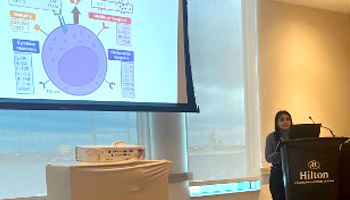HOW CAN WE HELP YOU? Call 1-800-TRY-CHOP
Sengupta Laboratory Research Overview

The Sengupta Lab is addressing the following questions in the context of lung infections:
- Is there an advantage for the lungs to respond differently to a pathogen based on the time-of-day at infection?
- What pathways are primed by the circadian clock to produce this advantage?
- Given that the lung is also a remarkably heterogenous organ, what cells drive the circadian regulation of the various processes that are at play during the different phases of the injury and host response?
- How do these peripheral clocks in the lung interact with the central clock located in the brain (supra-chiasmatic nuclei)? What happens if they are no longer in synchrony?
- How do life experiences, especially early life exposures, change the way the circadian clock develops?
We combine our expertise in epidemiology, immunology, pulmonology, and circadian biology to address these critical questions. Given the pervasive influence of circadian clocks over human physiology, the translational relevance of our work is wide-ranging. Our investigations will allow us to:
- Develop new therapeutic strategies via novel drug targets that strengthen the host circadian pathways.
- Provide a mechanistic basis for re-imagining a circadian-sensitive design of the intensive care units and hospital environment.
- Optimize current therapies by matching them to the host’s intrinsic clock mechanisms through chronotherapy and chrono-immunization.